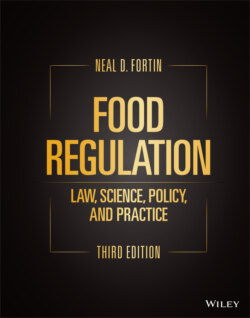Читать книгу Food Regulation - Neal D. Fortin - Страница 136
Discussion
ОглавлениеThe statute … condemn(s) every statement, design, and device which may mislead or deceive.
The same principle has been applied in this circuit United States v. An Article … Sudden Change, 409 F.2d 734, 740 (2d Cir. 1969). In the Sudden Change case, the court said that the test is not the effect of the label on a “reasonable consumer,” but upon “the ignorant, the unthinking and the credulous” consumer. Even a technically accurate description of a food or drug’s content may violate 21 U.S.C. § 343 if the description is misleading in other respects. Thus, whether or not the side panel of the Diet‐Thins label may accurately describe its virtues for certain special diets which do not appear to involve weight control, the misleading nature of the front panel still justifies condemnation of the seized articles. Moreover, claimant does not assert that the statements on the side panel apply in any different degree to Diet‐Thins than to its ordinary matzo crackers.
Purchasers of diet products are often “pathetically eager” to obtain a more slender figure. There can be no doubt that the weight‐conscious consumer may be led to believe that Diet‐Thin Matzos are lower in calories than ordinary matzo crackers. The exchange of affidavits, and the depositions and discovery sought by the claimant have no bearing on this basic issue.
Claimant may have a right to assert that ordinary matzo crackers have value in diet and weight control. If this were the issue, further discovery and cross‐examination of the government’s deponents might be useful. Since it is sufficient that only one label statement may be misleading in any particular, the use of the phrase “Diet‐Thins” violates the statute.
This does not appear to be a case where the label reference to Diet‐Thins can be clarified by an explanatory phrase… . The function of the court is merely to determine whether the existing label is misleading, not to tell the Food and Drug Administration what amendments may be appropriate in order to rectify the situation.
Claimant asserts that the government is bound or estopped by the asserted FDA approval of the label in 1963, or at any rate that the FDA should have given notice before filing a condemnation proceeding. The claimant does not assert, however, that it gave any notice to the FDA when it modified its regular matzos so as to have the same weight and caloric content as the Diet‐Thins. The change in the comparative contents of the package may render a label misleading which was truthful when it was first submitted. The asserted defense is inadequate to prevent the award of summary judgment.
It is ordered that the government’s motion for summary judgment be granted, and that a decree of condemnation be entered, and that defendants’ motions be denied.
* * * * *
